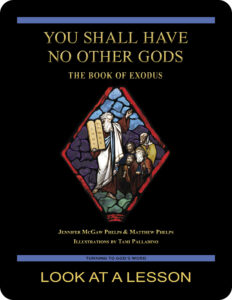name
 In some older translations of the Gospel According to Matthew 10:41–42, we encounter the odd phrase “in the name” three times: in the name of a prophet, in the name of a just person, and in the name of a student. In every case, it seems to provide an explanation for why something is done, though this idea comes into English awkwardly in translation.
In some older translations of the Gospel According to Matthew 10:41–42, we encounter the odd phrase “in the name” three times: in the name of a prophet, in the name of a just person, and in the name of a student. In every case, it seems to provide an explanation for why something is done, though this idea comes into English awkwardly in translation.
The Greek phrase is remarkably similar to its English translation with only one significant difference. The word translated as “in” is more correctly translated as “into.” This meaning can be more abstractly construed as “for the purpose of” or “for.” Additionally, the idea of a name in the ancient world carried more weight than it does today. A name was more than a word, it was an identity or a statement of being. So, perhaps a closer translation of this phrase is something like “because he is called a …” or even “because he is a … .” Indeed, this is the case with such contemporary translations of the Gospel According to Matthew 10:41–42 (NABRE) and (RSVCE).
In the context of the passage from the Gospel According to Matthew, the point of the phrase seems to be that whenever we receive a follower of God because that person is a follower of God, we receive a reward. When have you received someone or treated someone well because of that person’s association with God? How were you rewarded? Have you ever failed to receive someone or failed to treat someone well because of that person’s association with God? Have you ever been mistreated or ill-received because of your own association with God? How did you handle the situation, and are you satisfied with how you behaved at that time?
related topics: I AM; Lord; rock; YHWH
you also may like our study of the book of Exodus
 You Shall Have No Other Gods: The Book of Exodus, a 28-lesson Catholic Bible study with an imprimatur, provides an in-depth look at how significant events in biblical history that occurred thousands of years ago to descendants of Jacob remain relevant and even critical for present-day Christians to understand. The deliverance of the Hebrews from slavery in Egypt and the giving of Ten Commandments are examined along with the development of Moses’ relationship to God. Click on the book’s cover to view a sample lesson.
You Shall Have No Other Gods: The Book of Exodus, a 28-lesson Catholic Bible study with an imprimatur, provides an in-depth look at how significant events in biblical history that occurred thousands of years ago to descendants of Jacob remain relevant and even critical for present-day Christians to understand. The deliverance of the Hebrews from slavery in Egypt and the giving of Ten Commandments are examined along with the development of Moses’ relationship to God. Click on the book’s cover to view a sample lesson.
 Click on the picture of the statue of Moses with horns (above) to learn more about Lost in Translation. A new entry is archived each Monday. Contact us to receive Lost in Translation by email every week. You may use any of the contact links on our website to ask Matthew a question.
Click on the picture of the statue of Moses with horns (above) to learn more about Lost in Translation. A new entry is archived each Monday. Contact us to receive Lost in Translation by email every week. You may use any of the contact links on our website to ask Matthew a question.
